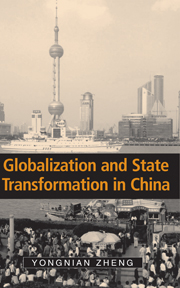Book contents
- Frontmatter
- Contents
- List of figures
- List of tables
- List of abbreviations
- Preface
- 1 Globalization: State decline or state rebuilding?
- 2 The state, leadership and globalization
- 3 Globalism, nationalism and selective importation
- 4 Power, interests, and the justification of capitalism: Constructing an interest-based political order
- 5 Bureaucratic reform and market accommodation
- 6 Building a modern economic state: Taxation, finance and enterprise system
- 7 State rebuilding, popular protest and collective action
- 8 Contending visions of the Chinese state: New Liberalism vs. the New Left
- 9 Globalization and towards a rule-based state governance?
- Notes
- Bibliography
- Index
- CAMBRIDGE ASIA-PACIFIC STUDIES
8 - Contending visions of the Chinese state: New Liberalism vs. the New Left
Published online by Cambridge University Press: 11 December 2009
- Frontmatter
- Contents
- List of figures
- List of tables
- List of abbreviations
- Preface
- 1 Globalization: State decline or state rebuilding?
- 2 The state, leadership and globalization
- 3 Globalism, nationalism and selective importation
- 4 Power, interests, and the justification of capitalism: Constructing an interest-based political order
- 5 Bureaucratic reform and market accommodation
- 6 Building a modern economic state: Taxation, finance and enterprise system
- 7 State rebuilding, popular protest and collective action
- 8 Contending visions of the Chinese state: New Liberalism vs. the New Left
- 9 Globalization and towards a rule-based state governance?
- Notes
- Bibliography
- Index
- CAMBRIDGE ASIA-PACIFIC STUDIES
Summary
Since state rebuilding involves interest redistribution, the affected social groups have been motivated to take part in this process. As China's political system is not open to popular participation, social groups have to find alternative ways to influence the process of state rebuilding. While underprivileged workers and peasants have resorted to “action” to achieve their goals, intellectuals have used their weapon, i.e., “knowledge”, to do so.
This chapter focuses on how Chinese intellectuals have contributed to the process of state rebuilding by conjuring up and presenting different discourses on state rebuilding. Though the state still imposes tight controls on academic freedom, there is room for such discourses to take place. While everyone agrees that reform is a process of state rebuilding, most people are not sure where it is leading. Chinese intellectuals came into this void and provided some cognitive road maps for the masses. Needless to say, different intellectual groups represented different political and economic interests. They have also variously criticized the government and challenged its policies. In this sense, the rise of contending visions of the Chinese state is also a part of the social movements since the 1990s. This chapter attempts to elaborate the two most important contentious visions of the Chinese state, those of the new liberalism and the new left.
The rise of intellectual discourse in the post-Tiananmen era
The rise of the new liberal and new left intellectual discourses in the post-Tiananmen era is deeply rooted in changes in China's domestic and external affairs.
- Type
- Chapter
- Information
- Globalization and State Transformation in China , pp. 162 - 186Publisher: Cambridge University PressPrint publication year: 2003



